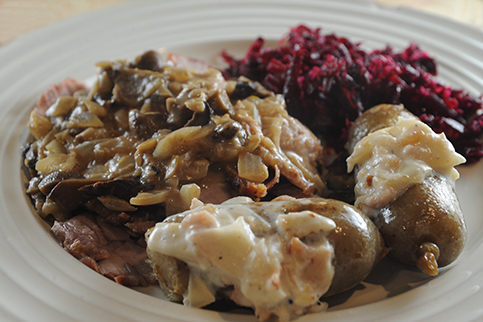 |
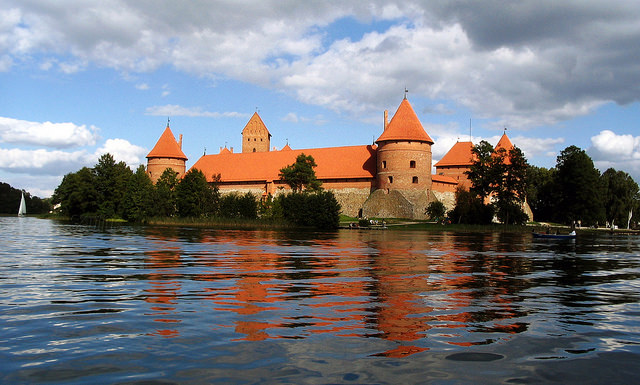 |
| Castle of Trakai, Lithuania. Photo by SU. |
Lithuania is a former Soviet state--today it is kind of a funky democracy. It has a president, but much like the Queen of England, the office is largely ceremonial, though the president does have some foreign affairs and national security powers. She also appoints the prime minister and a bunch of other offices, and those are the people who do the actual running-of-the-country stuff.
Baked Pork in Mushroom Sauce (Kepta kiauliena grybø padaþe)
(from The Anthology of Lithuanian Ethnoculture)
- 2 lbs pork, any cut
- Juice of 1 lemon
- Powdered bay leaves
- Salt and pepper to taste
- 6 tbsp vegetable oil or butter
- 3 oz dried mushrooms
- 2 onions, finely chopped
- 1 cup mushroom cooking juice
- 2 tbsp sour cream
- 1 tbsp flour
- 4 tbsp butter
(from Eastern European Food)
For the sausage:
- 12 medium peeled russet potatoes, finely grated
- 1 large onion, finely chopped
- 3 tbsp butter or 3 strips bacon, chopped
- 2 large eggs
- 1/2 tsp marjoram (optional)
- Salt and pepper to taste
- Hog casings, rinsed three times
- 1/2 lb bacon, diced
- 1 large onion, chopped
- 1 cup sour cream
- Black pepper to taste
(also from The Anthology of Lithuanian Ethnoculture)
- 4 beets, cooked, finely grated
- 1 cup grated horseradish root
- 1/4 tsp pepper
- 3 tbsp vegetable oil
- Juice of 1/2 lemon
- Salt to taste
(from Natasha's Kitchen)
For the cake:
- 1/4 honey
- 3/4 cup granulated sugar
- 2 tbsp unsalted butter
- 3 large eggs, beaten with a fork
- 1 tsp baking soda
- 3 cups all-purpose flour
- 5 cups crème fraiche
- 5-7 tbsp confectioners sugar
- 3-6 tbsp fresh lemon juice
- 2 lemons, zest
- 2 oranges
- 2 cups sugar
- 4 cups water
Anyway, first you're supposed saute the onion in the butter, or with the bacon (that's what I did). When the onion is soft, take it off the heat and let it come back to room temperature. Now mix the grated potatoes with the onion and add the eggs, marjoram, salt and pepper. The thickness of the mixture should be roughly equal to the thickness of ground pork. If it isn't, add some flour.
 |
As per the instructions, I stuffed the potato mixture into the grinder and turned the handle, and liquid went everywhere. It dripped out of every single crevasse in the machine and spilled all over the wobbly TV tray and onto the floor. It was an absolute mess, and by the time I filled all the casings I'd also soaked an entire beach towel in potato water.
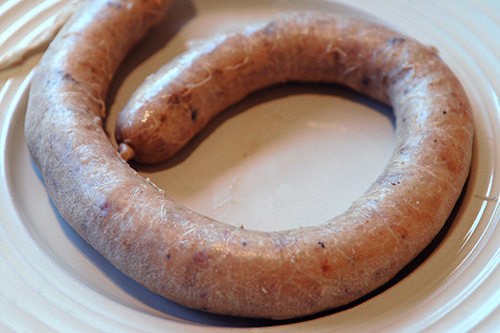 |
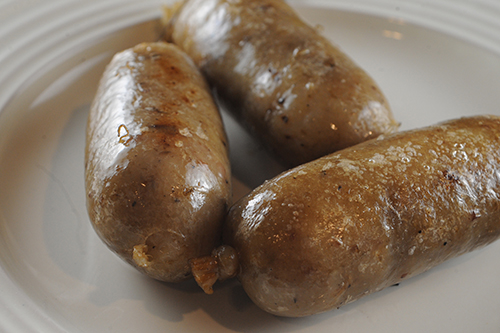 |
| I kind of tried to twist them back, with limited success. |
While the sausages are cooking, fry the rest of the bacon with the onion until the onion is translucent and the bacon is cooked through. Drain off the fat and then mix in the sour cream and black pepper. If the sauce is too thick, add a little bit of milk. Serve the sausages with the sour cream sauce poured over.
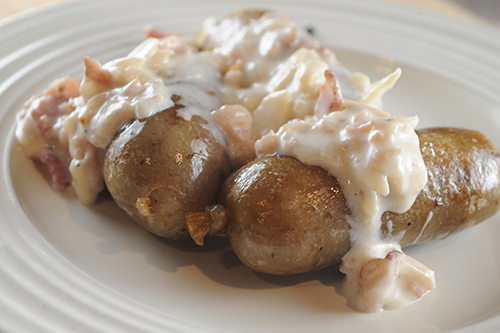 |
First rub the meat all over with lemon juice, then sprinkle with the salt, pepper and powdered bay leaf. Now put the oil and meat into a casserole and bake at 350 degrees, basting occasionally. The meat is done when the internal temperature reaches 145 degrees.
Meanwhile, cook the mushrooms in boiling water and remove with a slotted spoon, reserving the cooking water. Melt the butter in a medium sized pot and julienne the mushrooms. Add the mushrooms and onions to the melted butter, then whisk in the flour. Add the mushroom juice, sour cream, salt and pepper while continuing to whisk. Turn down the heat and let the sauce thicken.
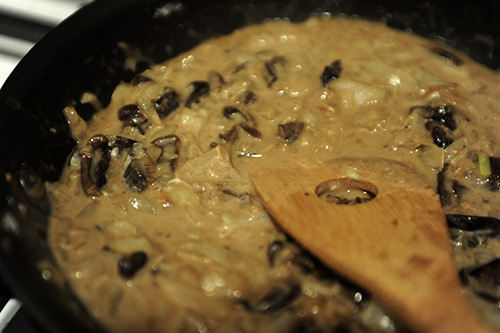 |
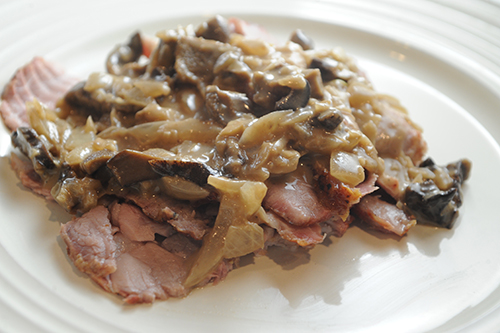 |
First roast your boats in a hot oven until soft. Peel them and grate them.
Now grate the horseradish, then mix everything together. Done!
 |
Here goes.
First, you're going to be making some candied orange peel. To do this, you need to peel the oranges and then cut off as much of the pith as you can (that's the bitter white part). I actually scraped mine down so I could only see orange.
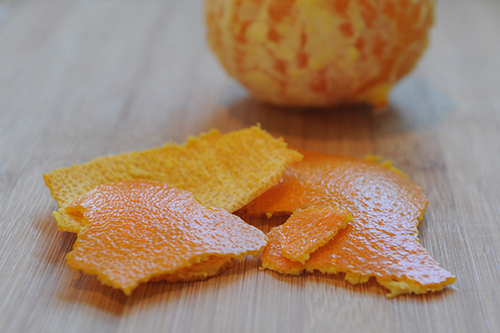 |
Now boil two cups of the water and add the peel. Let it soften up for a few minutes and then drain and set aside. Next, bring the other two cups of the water to a boil and add the sugar. Reduce heat, then drop in the peel and let simmer until the peel is translucent. This should take about 30 minutes. Drain and transfer to a drying rack (I used my pizza screen because it has smaller holes so the peel wouldn't fall through). Let dry for three to four hours, then chop fine. Reserve the syrup it cooked in, not because the recipe said to but because it's yummy.
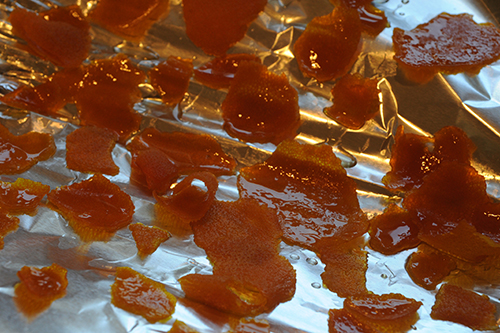 |
OK now mix the crème fraiche* with the lemon zest, sugar and lemon juice. Please note: don't use an electric mixer. That's what I did and my crème fraiche curdled. It was awful, though my husband did manage to save most of it by straining it. So don't use an electric mixer, instead just fold it all together. Keep tasting it until it's to your liking. It should be a little bit sour with a hint of sweet. Finally, fold in the candied peel.
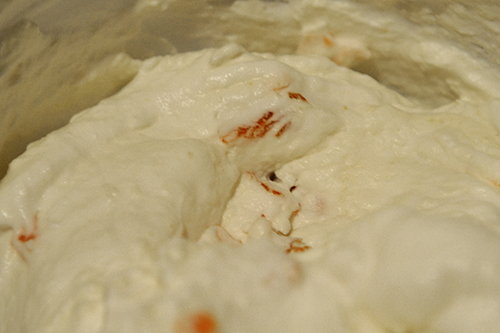 |
*Note: Crème fraiche is super expensive, and super easy to make. The day before you make this cake, mix 5 cups of heavy cream with 2/3 cup of buttermilk. Cover it with a clean towel and let it sit out overnight in a warm place. In about 12 to 18 hours, you will have crème fraiche.
OK now put the sugar, honey and butter in a medium pan and heat gently until melted and blended. Use a low flame so you don't scorch the ingredients. Remove from the heat and add the eggs, but keep whisking as they go in, otherwise the heat from the melted butter will scramble them.
Now whisk in the baking soda until well incorporated, then add the flour in 1/2 cup increments. Fold it in gently--when the texture is a bit like Play Dough it's ready.
Cut the dough into 8 equal sized portions. It's important to do this while it's warm. Trust me on this one, because I didn't believe the author when she said that and I let mine cool down. When cool, it's really difficult to roll out.
Which brings me to the next part: rolling out. Flour a rolling pin and a large surface and roll each piece out into a circle with about a quarter inch thickness. Use a nine inch plate as a template to make sure all the circles are exactly the right size. Save all those trimmings--you'll be using them later. Unless you literally can't make your circles large enough because you were dumb and tried to do all of this with cold dough.
Are you tired yet? Next you'll be baking each circle at 350 degrees for four or five minutes on a sheet of waxed paper, until golden. When done each circle should resemble a sort of large, thick tortilla. Let them cool separately on a wire rack. Keep going until you've baked them all.
Now bake all those little scraps, if you have any little scraps. Put them in a food processor and pulse until you get some fine crumbs.
The home stretch: spread 1/3 cup of the crème fraiche mixture on each cake piece. Top with the next piece, pressing down, and repeat. Keep going until you're out of layers, then frost the sides with the leftover crème fraiche mixture, unless you curdled all yours and don't really have enough left over to do that.
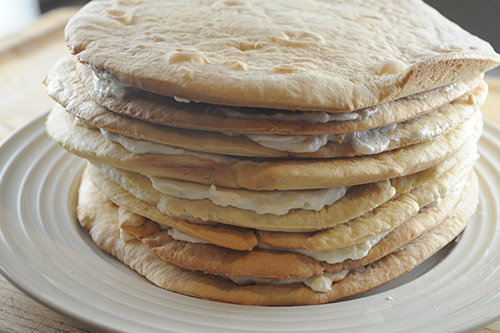 |
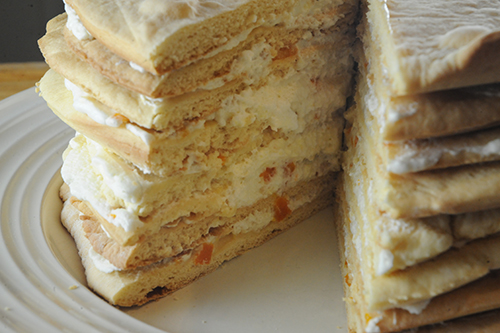 |
| I didn't have enough crème fraiche to frost the whole thing. |
Here's what we thought. But wait, first I have to say that between grating potatoes and grating beets and grating horseradish by the time I was done with this my arms ached so badly I could hardly lift them. So now that you know just how out of shape I actually am:
Beets are my new favorite thing, so I loved the beet salad with the grated horseradish. Yum. And I enjoyed the pork, too, with the mushroom sauce. It was basic, but basic in a nice, hearty way. The sausage was, meh. It had a lot of potential but it was an awful lot of mess and trouble for what basically amounted to some mashed potatoes in a sausage casing. If I did this again, I would definitely use more bacon. A lot more bacon.
Now, I bet you wanted to know what we thought of the cake. It was a ton of work and like I said I swore I would never do it again, but you know what? I would totally do it again. It was that good, and worth the work for sure. Anyway now that I got all the kinks worked out I'm pretty sure I could make it a lot more quickly next time. And I promised my kids there would definitely be a next time.
Next week: Luxembourg











Dear Becki, I absolutely love your blog, your stories and your food philosophy! The post about Lithuanian cuisine is great as well. Alas, one of your sourse has misleaded you: we never ever boil vedarai in Lithuania. The only proper way to prepare them is to bake slowly for 1,5-2 hours. The top of vedarai should be golden and crunchy, and the inside - very soft and creamy. Normally we eat them with sour cream. So, have a good luck if you decide to make vedarai one day again :)
ReplyDeleteThank you Kristina! It's so hard to know which websites to believe. I try to find authentic sources but even when I do I occasionally (more often than I like) hear from people who tell me my recipe source was wrong. Thanks for setting me straight, and I may try to make vedarai again now that I know what went wrong. If I am ever brave enough to go near that sausage machine again, lol!
ReplyDelete